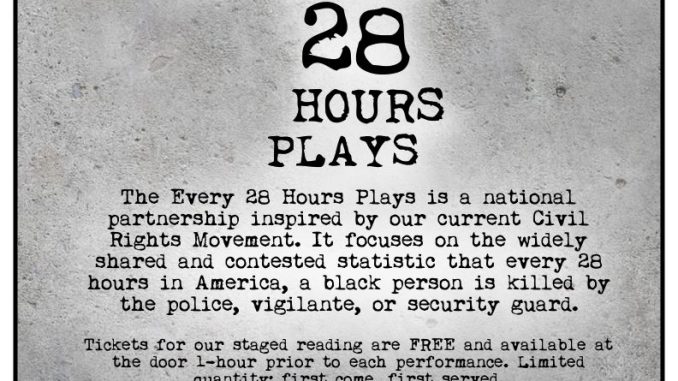
Every 28 hours a black person is killed by a vigilante, security officer, or police officer.
On Saturday Feb. 10 and Sunday Feb. 11, SUNY New Paltz participated in the “Every 28 Hours Plays” project. The project includes a collection of 72 one-minute plays inspired by the Black Lives Matter movement in proactive efforts to bring issues of racism, oppression and inequality to the forefront of our thoughts.
The play’s unique form focuses heavily on dialogue that moves the audience through allegories of the oppressed in nine heart-rending sections: introduction, race, police, community, protest, history, mothers, youth and finale. The play ends with a call to action that asks the audience to become involved in changing this disturbing statistic.
The Ferguson Moment and killing of Michael Brown sparked a national response to the oppression and violence towards not only the black community, but other minority groups as well. “Every 28 Hours” was one of the artistic responses to The Ferguson Moment in efforts to resist racially charged police brutality.
“The Fall,” by Shruti Purkayastha was a recount of oral history, listing several locations where injustice occurred, such as Philippines, Detroit, Pakistan, Watts, Korea, Baltimore, Iraq and Ferguson.
“All Convenience” by Claudia Alick is an allusion to the death of Eric Garner. The play begins with a convenience store being on fire, but everyone is hesitant to help and are shouting “all convenience stores matter,” when the fire starts to affect everyone, they finally try to help, but end up hosing down the wrong convenience store. The play ends in a crescendo of “I can’t breathe” said in unison.
The plays continually emphasized several names that were victims of police brutality, such as Trayvon Martin, Tamir Rice, Michael Brown, Freddie Gray, Sandra Bland and many others.
The final piece, “Unknown Thousands” by Nikkole Salter, was performed by all 34 actors, and brought the project to a close by chanting the names of thousands of unknown victims throughout history.
Three professors, two visiting directors and one UPD officer participated as panelists in the talkback that followed the performance. They commented on the importance of discussing the upsetting topics of race relations in times of unreasonable violence.
“I’m always enthusiastic about discomfort because that’s where true growing takes place,” said Assistant Professor Tyrell Connor of the sociology department. “The play does a lot for the understanding and communication of this very sensitive, but much needed-to-be-discussed topic.”
When asked what this play will do for the community, visiting Director Aurelia Clunie said, “I think that’s what this piece of theater does, and what all theater does. It allows us the space for empathy and to understand.”
“The biggest thing I learned from this play was that we could all use a little more empathy,” Audience member and political science major Angela Guerin said. “Humanizing each other shouldn’t be an afterthought, it should be automatic.”
While there is enthusiasm for the continued success and discussion of the “Every 28 Hours” project, the hope is that the conversation leads to change.
